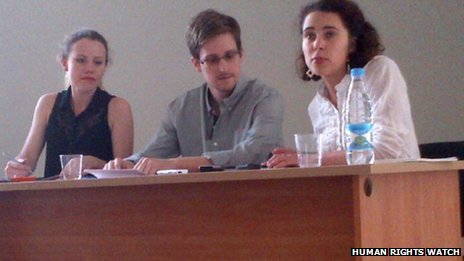
Edward Snowden has been holding a meeting with leading human rights groups and lawyers at Sheremetyevo airport in Moscow.
The fugitive US intelligence leaker requested the meeting with around 10 activists in the airport transit zone.
Edward Snowden told activists he was seeking political asylum in Russia. He had earlier dropped his application when Moscow said he could stay only if he stopped leaking US secrets.
The Kremlin reiterated this condition on Friday.
“Mr. Snowden could hypothetically stay in Russia if he first, completely stops the activities harming our American partners and US-Russian relations and second, if he asks for this himself,” President Vladimir Putin’s spokesman Dmitry Peskov said.
Edward Snowden is wanted by the US on charges of leaking secrets about US surveillance schemes.
He has sent requests for political asylum to at least 21 countries, most of which have turned down his request.
However, Bolivia, Nicaragua and Venezuela have indicated they could take him in.
It is thought he is considering seeking political asylum in Russia because he cannot fly out of Moscow.

“He wants to stay here until he can fly to Latin America,” Tatyana Lokshina of Human Rights Watch is quoted as saying.
Edward Snowden, 30, is unable to leave the transit zone without asylum documents, a valid passport or a Russian visa, none of which he reportedly has.
He has reportedly been stuck in transit since arriving in Moscow from Hong Kong on June 23.
On Friday, the first photo in three weeks of Edward Snowden emerged. It was taken by Tatyana Lokshina during the airport meeting.
Other activists present at the gathering included Sergei Nikitin, the head of Amnesty International’s Russia office, prominent Moscow lawyer Genri Reznik and Russia’s presidential human rights ombudsman, Vladimir Lukin.
A large press scrum gathered at the airport ahead of the meeting, while Interfax reported Edward Snowden had moved from his room in the airport’s Capsule Hotel to attend the meeting.
Tatyana Lokshina earlier posted the text of Edward Snowden’s invitation email on her Facebook page.
In the message, Edward Snowden complained that the US government was waging an “unlawful campaign” to prevent him from securing asylum.
“This dangerous escalation represents a threat not just to the dignity of Latin America or my own personal security, but to the basic right shared by every living person to live free from persecution,” the message read.
The email said the fugitive wanted to discuss the “next steps forward” in his situation.
It also instructed those attending to bring a copy of the invite and identification papers, as “security will likely be tight at this meeting”.
The meeting was not open to the press. Edward Snowden said he planned to address journalists at a later stage.
Edward Snowden had previously applied for Russian asylum but President Vladimir Putin said he would only be welcome if he stopped “his work aimed at inflicting damage on our American partners”.
Even if a country accepted Edward Snowden’s application, getting there could prove difficult.
Last week, several European countries refused to allow the jet of Bolivian president Evo Morales to cross their airspace on its way back from Moscow – apparently because of suspicions that Edward Snowden was on board.
Washington seeks to prosecute Edward Snowden over the leaking of thousands of classified US intelligence documents.
The leaks have led to revelations that the National Security Agency (NSA) is systematically seizing vast amounts of phone and web data.
They have also revealed that both the UK and French intelligence agencies allegedly run similarly vast data collection operations, and the US has been eavesdropping on official EU communications.
The case has strained relations between the US and China.
President Barack Obama said on Thursday he was “disappointed” that China had chosen not to hand over Edward Snowden to the US authorities when he was in Hong Kong in June.
A US government official said the decision had undermined calls for co-operation between the two countries.
But China said Hong Kong – which allowed Edward Snowden to leave for Russia – had acted in accordance with the territory’s law.
“Its approach is beyond reproach,” Chinese state councillor Yang Jiechi said.